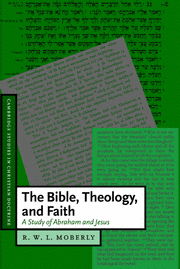Book contents
- Frontmatter
- Contents
- Preface
- 1 The Bible, the question of God, and Christian faith
- 2 Christ as the key to scripture: the journey to Emmaus
- 3 Abraham and God in Genesis 22
- 4 Ancient and modern interpretations of Genesis 22
- 5 Genesis 22 and the hermeneutics of suspicion
- 6 Jesus in Matthew's Gospel as Son of God
- 7 Summary and prospect
- References
- Index of scriptural references
- Index of names
- Index of subjects
6 - Jesus in Matthew's Gospel as Son of God
Published online by Cambridge University Press: 02 December 2009
- Frontmatter
- Contents
- Preface
- 1 The Bible, the question of God, and Christian faith
- 2 Christ as the key to scripture: the journey to Emmaus
- 3 Abraham and God in Genesis 22
- 4 Ancient and modern interpretations of Genesis 22
- 5 Genesis 22 and the hermeneutics of suspicion
- 6 Jesus in Matthew's Gospel as Son of God
- 7 Summary and prospect
- References
- Index of scriptural references
- Index of names
- Index of subjects
Summary
Hitherto we have considered the portrayal of Abraham in Genesis 22. We have sought to establish a rigorous exegetical basis for interpretation, in the light of which we have reflected on some of the possible strategies for appropriating the ancient text in a contemporary context. In this chapter we will consider how the substantive issues of human life in relation to God as raised in Genesis 22 are raised in the New Testament also – an exercise quite distinct from studying the specific New Testament usage of Genesis 22. That is, how do divine testing, providing, and blessing relate to appropriate human response to God when they are focussed in Jesus Christ? In the light of a study of Old and New Testaments together we will then be best placed to consider what the implications of the biblical text for today might be.
The exegetical basis within the New Testament will be a study of Jesus as Son of God, as this is portrayed in Matthew's Gospel. There are four reasons for this focus upon Matthew's Gospel.
First, a focus upon one specific gospel takes seriously the genre of gospel as a coherent portrayal of Jesus. The four evangelists each offer their own construal of Jesus, all four of which have been received as authoritative for Christian faith and theology. The concern here is not to address the differences between, or interrelationship of, these portrayals, but solely to grasp the contours of one, the one which introduces the New Testament as a canonical collection (as Genesis introduces the Old Testament as a canonical collection).
- Type
- Chapter
- Information
- The Bible, Theology, and FaithA Study of Abraham and Jesus, pp. 184 - 224Publisher: Cambridge University PressPrint publication year: 2000



